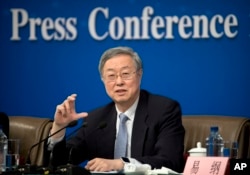China is witnessing a rare protest from heads of some major Chinese companies who say government controls on the outflow of funds are hurting their ability to strike business deals overseas. Starting late last year, the government began imposing strict controls on currency transfers in a desperate bid to curb outbound investments and stop the yuan from weakening.
Last year alone, Chinese companies struck deals overseas worth $225 billion; but according to data compiled by Bloomberg, there have only been $19 billion in acquisitions abroad, announced by Chinese companies so far this year, a 74 percent drop from the previous year.
Beijing asked banks to closely scrutinize money transfers, and reject requests from certain companies to move funds to foreign countries for investments in late 2016, a year when Chinese companies struck deals overseas worth $225 billion. China feels that massive fund outflows put pressure on the Chinese Yuan, which has been steadily devaluing against the U.S. dollar since early last year.
The government clampdown has had a significant effect. According to Bloomberg's data, there has only been $19 billion in acquisitions abroad announced by Chinese companies so far this year, a 74 percent drop from the previous year.
Feeling the pinch
On the sidelines of high-level political meetings in Beijing, a time typically seen as an opportunity to build consensus and not air dissent, business leaders who attended the talks were blunt in their criticism of the controls.
Zhang Yichen, chief executive officer of investment firm Citic Capital Holdings, told reporters that it is almost impossible to use the yuan to invest overseas.
"To say that capital controls don't have any impact - it's a lie," said Zhang.
Zheng Yuewen, chairman of Chinese drugmaker Creat Group, said, “The foreign exchange management is so strict now that it's almost impossible to move funds out.”
Investments plunge
Over the past two months, China's outbound investments have nearly been cut in half and government controls are a key reason for this, Julian Evans-Pritchard, China economist for Capital Economics, told VOA.
“It has certainly hurt a lot of Chinese companies who are active in the overseas market,” he said. "But I don't think the government is going to ease controls until outbound flows come down to the level it is comfortable with.”
According to China’s Ministry of Commerce, outbound investments plunged by 39.5 percent in December 2016 and 35.7 percent in January of this year as the government began applying the brakes. The drop was dramatic when compared to the surge seen in the previous two months when outbound investments increased 48.4 percent in October and 76.5 percent in November of last year.
The government's control of fund outflows could become even more stringent as the U.S. Federal Reserve is expected to review interest rates this week. A rate increase would make it more lucrative to invest in the United States, and make it increasingly difficult for Beijing to stem the exodus of money, analysts said.
Standing firm
Although the blunt remarks from CEOs were aimed at persuading officials such as the head of the People's Bank of China and others to loosen restrictions, the government is showing little sign of budging.
At a press conference on the sidelines of the Beijing meetings, People's Bank of China Chairman Zhou Xiaochuan stuck to the government's view that curbs were necessary to manage the currency. He also blamed "irresponsible investments" made by Chinese companies in foreign markets for causing the problems.
Zhong Shan, China’s minister of commerce, said a small number of companies was investing “blindly and irrationally overseas” and running into a range of financial problems. He said that is hurting the image of Chinese investors overseas; but, he did assure investors that what he called “normal investments” would not be impacted.
“There are clearly some who are of the view that China is cooling down, that it is not encouraging investments overseas, but this view is incorrect,” said Zhong.
Analysts agree that not all investments are off limits, but the government's statements downplay the impact controls are having. A quick glance at the numbers reveals that clearly there are some types of investments authorities are looking to slow.
No superheroes
Right now, there is a big focus on property developers looking to invest overseas, said Andrew Collier, managing director of Orient Capital Research. Media and entertainment investments are also facing challenges, he said, but adds the government is being very selective about just who it is saying no to.
“They are focusing most of their opposition on deals where they feel have no value to the Chinese country,” Collier said. In some cases, the government is saying, “It might be nice for you and your business to expand your business overseas, but we don’t think that making films about superheroes is going to benefit the Chinese economy.”
Chinese companies such as Dalian Wanda have been ramping up investments in Hollywood and entertainment over the past year. Last Friday, however, a $1 billion deal for the Chinese conglomerate to purchase Dick Clark Productions – which produces the Golden Globe Awards - fell through.
At the same time, however, a $43 billion deal between ChemChina and Swiss crop protection and seed group Syngenta is moving forward.
“That is a very large deal, and so far there has been no opposition to it,” Collier said. “If you have a deal for a-half-a-billion or a billion dollars it might get a lot of attention in the press, but it is actually not that much money compared to some of the other stuff that is still committed to be going forward.






